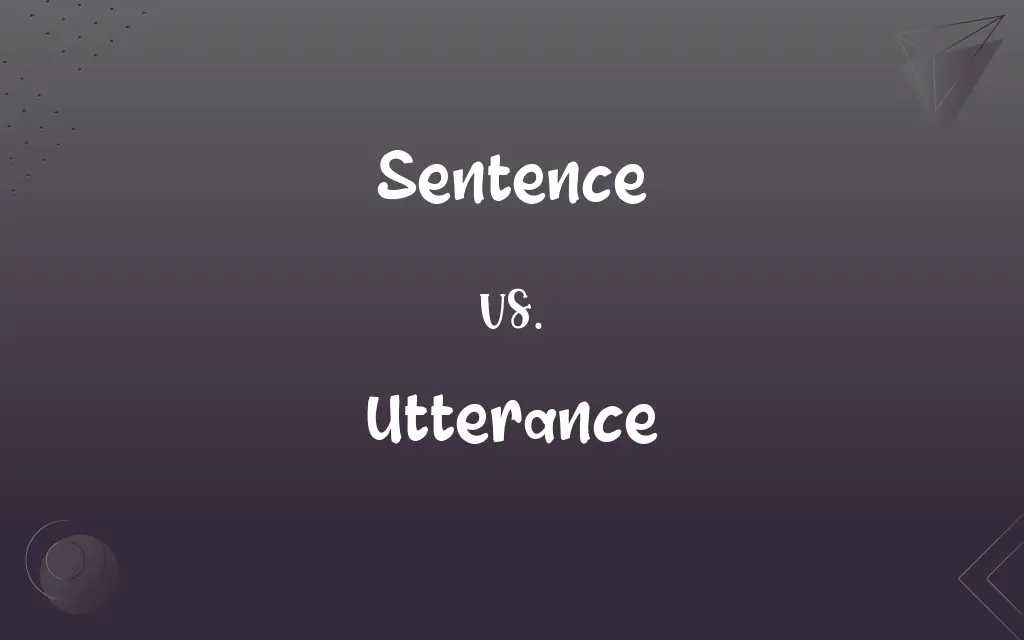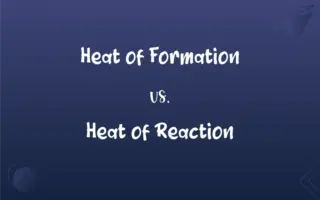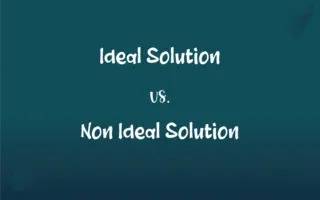Sentence vs. Utterance: What's the Difference?
Edited by Aimie Carlson || By Harlon Moss || Updated on October 7, 2023
A sentence is a grammatically complete idea expressed in words, while an utterance is any spoken word or sound, not necessarily grammatically or logically complete.

Key Differences
A sentence always adheres to grammatical rules and structure, ensuring that it conveys a clear and complete thought or idea. A sentence is a product of the syntactic rules of a language, encapsulating subject-predicate structures and adhering to specific grammatical norms to ensure clarity and comprehensibility. In various contexts, the sentence may serve to declare, question, command, or exclaim, always ensuring that the components within it cooperate towards a unified meaning.
In contrast, an utterance doesn’t necessarily need to adhere to grammatical rules and might not express a complete thought. Utterance places a spotlight on the act of producing speech sounds, regardless of their syntactical correctness or logical cohesiveness. It is situated within the realm of pragmatics, where context drives the meaning and interpretation of the verbal expression. An utterance, therefore, places less emphasis on structural wholeness and more on the communicative act itself.
Comparing both, a sentence is often bound by grammatical structures and aims at providing a clear, complete idea or information. It functions within the structured confines of syntactical and grammatical rules, ensuring that the ideas or intentions communicated are explicit and clear to the receiver. Sentence structures are integral in formal communications, where clarity and completeness are paramount.
On the other hand, utterances may or may not form complete sentences but they're essential in casual and interpersonal communication where context, intonation, and expression often carry more weight than grammatical correctness. Utterances encapsulate the emotional, social, and situational contexts of speech, providing a rich tapestry through which speakers navigate the numerous, nuanced corridors of everyday communication.
In linguistic studies, sentences and utterances both hold pivotal places, albeit in different contexts and applications. While sentences are scrutinized to understand the syntactic, semantic structures of a language, utterances are studied to glean insights into the pragmatic, socio-linguistic, and interactive aspects of communication. Both sentence and utterance, therefore, provide a comprehensive view of language in its structured, rule-driven aspect and its live, dynamic, and context-driven guise respectively.
ADVERTISEMENT
Comparison Chart
Definition
A grammatically complete expression of idea
Spoken word(s) or sound, may lack grammar
Grammatical Rules
Must adhere to rules
Rules can be relaxed or non-existent
Completeness
Must express a complete thought
Can be logically/grammatically incomplete
Dependency
Independent, context often not required
Often depends on context for interpretation
Usage Scenario
Formal communication, written language
Casual communication, spoken language
ADVERTISEMENT
Sentence and Utterance Definitions
Sentence
A sentence is a set of words expressing a complete thought.
The dog barked loudly.
Utterance
An utterance is any spoken sound or word, potentially without grammatical structure.
Uh, um, er…
Sentence
A sentence can be complex, comprising clauses and different parts of speech.
Although it was raining, they decided to go for a walk.
Utterance
An utterance might consist of phrases or words not forming complete sentences.
“So hot…” (while wiping sweat)
Sentence
A sentence adheres to grammatical rules and structures within a given language.
She carefully placed the book on the shelf.
Utterance
An utterance is driven by and interpreted through context.
Cold, isn’t it? (while shivering)
Sentence
A sentence contains a subject and a predicate and conveys a statement, question, exclamation, or command.
Where is the nearest gas station?
Utterance
Utterance relies on vocal expression and can include non-verbal vocal sounds.
“Ah!” (expressing realization)
Sentence
A sentence in written language is typically separated by punctuation.
He exclaimed, “What a beautiful sunset!”
Utterance
Utterances might be structured as sentences or be fragmented and incomplete.
“But I thought…” (leaving a thought unfinished)
Sentence
A grammatical unit that is syntactically independent and has a subject that is expressed or, as in imperative sentences, understood and a predicate that contains at least one finite verb.
Utterance
The act of uttering; vocal expression.
Sentence
The penalty imposed by a law court or other authority upon someone found guilty of a crime or other offense.
Utterance
The power of speaking; speech
As long as I have utterance.
FAQs
What is a sentence?
A sentence is a grammatically complete expression of an idea, containing a subject and predicate.
Can a sentence be an utterance?
Yes, a sentence can be an utterance if it is spoken within a communicative context.
How does punctuation affect a sentence?
Punctuation marks in a sentence guide its structure, clarity, and meaning by indicating pauses, ends, and emotional tones.
Can utterances include non-verbal sounds?
Yes, utterances can include non-verbal sounds, like sighs or expressive noises, which carry meaning in context.
Can a sentence express different types of ideas?
Yes, a sentence can express statements, questions, commands, or exclamations, based on its structure and punctuation.
What defines an utterance?
An utterance is any spoken word or sound, which may or may not follow grammatical rules or form a complete idea.
Can utterances be analyzed in written texts?
Yes, utterances can be analyzed in written texts when exploring dialogues or examining speech in literature.
How does context influence an utterance?
Context gives meaning to utterances, especially when they're fragmentary or ambiguous, by providing situational understanding.
Can a sentence be made of a single word?
Yes, a single-word sentence, like “Go!” is grammatically complete, providing a clear command.
What role does a subject play in a sentence?
A subject in a sentence indicates who or what the sentence is about, often performing the action.
How are sentences used in written language?
Sentences in written language convey complete ideas and are structured using grammatical rules and punctuation marks.
What is the pragmatic function of utterances?
The pragmatic function of utterances is to convey meanings in specific contexts, often relying on shared knowledge or assumptions.
How can a sentence be improved for clarity?
Enhancing sentence clarity involves ensuring grammatical accuracy, logical flow, and utilizing appropriate vocabulary and punctuation.
What role does intonation play in utterances?
Intonation in utterances can express emotions, ask questions, or imply meanings, especially in ambiguous or incomplete expressions.
Is grammatical accuracy crucial in a sentence?
Yes, grammatical accuracy in a sentence is vital for clear and precise communication, especially in formal contexts.
Can gestures be considered utterances?
In general linguistics, no, but in broader communication studies, gestures might be analyzed similarly to vocal utterances.
Is an utterance always a sentence?
No, an utterance is not always a sentence; it might lack grammatical structure or completeness.
Can an utterance be non-vocal?
Typically, no. Utterances are vocal, but non-vocal communication might be considered a form of utterance in specific study areas.
What’s an example of a complex sentence?
“While I enjoy hiking, my brother prefers cycling,” is a complex sentence with multiple clauses.
Are utterances always intentional?
No, utterances can be intentional or unintentional, including involuntary sounds or expressions in conversation.
About Author
Written by
Harlon MossHarlon is a seasoned quality moderator and accomplished content writer for Difference Wiki. An alumnus of the prestigious University of California, he earned his degree in Computer Science. Leveraging his academic background, Harlon brings a meticulous and informed perspective to his work, ensuring content accuracy and excellence.
Edited by
Aimie CarlsonAimie Carlson, holding a master's degree in English literature, is a fervent English language enthusiast. She lends her writing talents to Difference Wiki, a prominent website that specializes in comparisons, offering readers insightful analyses that both captivate and inform.































































